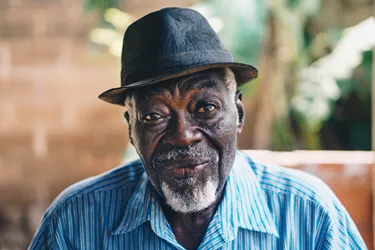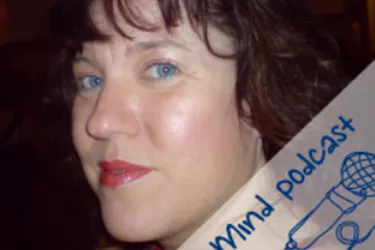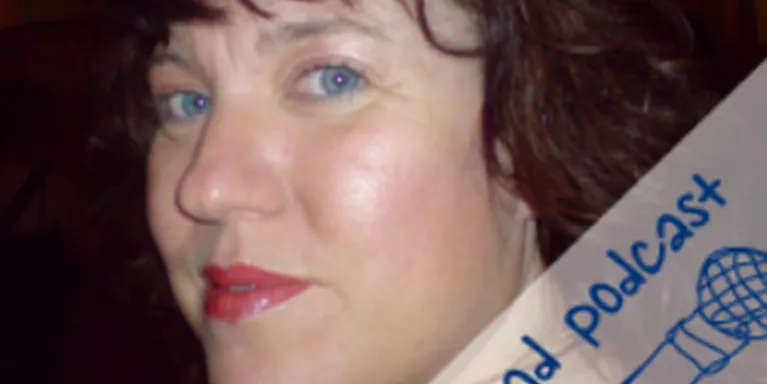Mind podcast - Living with SAD
Sarah talks to us about living with seasonal affective disorder (SAD) and how friends and family can help.
For more info on some of the issues covered in this podcast, click below:
- Information on seasonal affective disorder (SAD)
- How friends and family can help people with SAD
- About depression
- Information about the support you can get while studying
- How physical activity can affect your mood
Hello. My name is Sarah Merriman. I have suffered from clinical depression and seasonal affective disorder since I was 18 years old.
For me, probably the best way of describing SAD is like the Eeyore character in Winnie the Pooh who walks around with that rain cloud over his head all the time and, you know, the grumpy kind of face.
When that time of year comes around, the October/November time of year, that is how I feel. I feel like, all of a sudden, I've got this cloud hanging over me and that wherever I go it's like that and I'm desperate to blow that cloud away and to see the sun.
"I feel that things get on top of me more easily. I feel more irritable. I get angry more easily. I feel more hopeless."
If I were ever to think about starting a new project or doing something different, those kind of ideas never really come to me at that time of the year.
I almost feel like an animal, that I want to hibernate. The dark and the grey comes and I really, I would just love to pull the covers over my head and say, wake me up in March and that, really, is how I feel.
The first time I experienced depression was when I was 18 years old and I had passed my A Levels and I'd gone to Nottingham University to start a geography degree. I was anxious about going but at the same I was really looking forward to it and I thought, you know, this is a start to the rest of my life, I'm on my way up and I've done really well and I was proud of my achievements. I was in halls of residence on campus. It was an all girls hall of residence.
"To start with I just thought that the way I was feeling – you know, I felt a bit down, a bit anxious – I thought that it was just the adjustment process of going to university, being away from home."
But after a while, as the nights drew in and it started to get darker, my mood started to drop even more. I just thought that I wasn't coping with being away from home, that perhaps I'd chosen the wrong course or the wrong place.
And as the term went on I just got more and more down. I just felt like I wanted to stay in my room. I wanted to shut the door, get into bed and not get out.
I found it a struggle to get up in the morning. I found it a struggle to go to lectures. I was in such a turmoil inside of me that I could only cope with the day-to-day basics.
I eventually went to the doctor on-site but there wasn't enough intervention to make me feel supported or that I could carry on and I dropped out.
So I'd reapplied to do law and I'd been accepted by Wolverhampton Polytechnic and I'd got the place for that September.
I went to Wolverhampton and exactly the same thing happened. I started there in the September, you know, again, I made friends.
"But as the nights drew in that kind of feeling, sort of, swamped me again."
But I managed with some help to get through that, you know, in that first year.
But come the start of the second year, the exact same thing happened and that time was one of the worst times. I literally left a couple of weeks early and I went home, again, desperate.
You know, that can't get outside, can't function properly. And I was at such a low point then that I wouldn't even get out of bed and my father – I mean, I was 19 by this point –
"I can still remember my father spoon-feeding me in bed because I wouldn't eat."
It was like I'd shut down completely and, you know, I couldn't... I literally... it was almost like hibernation. You know, it wasn't that I didn't want to go outside, I didn't even want to get out of bed, it was that bad.
Not every year has been like that since but for me personally I think that if I'm undergoing particularly stressful events and they coincide with that time of year, there's something inside of my brain that really struggles to cope with it.
One of the things that I do find about SAD is that my tendency and my natural reaction to it is to want to stay inside, close the curtains, pull the covers over my head and not go anywhere.
But I know from past experience that if I start to do that, that I become very withdrawn, very insular and then that has a tendency to start me on a downward spiral, which the further you get down, I found from experience, the harder it is to get back up again.
So recognising now every time the nights start to draw in and it starts to come to the end of October when the clocks change, to realise that there's a great likelihood that this is going to happen to me again.
"I put measures in place, not so I can stop it happening but it's that I can cope with it and deal with it far better when it does happen."
The kind of things that help me deal with SAD are, firstly, getting outside into the fresh air, taking some physical exercise, even if it's just a stroll but the more I'm out in the fresh air during daylight hours in the winter months the better. It always lifts my mood.
The other thing I've found that really helps, I love to swim. Once I get in that swimming pool and I actually start swimming, it just makes me feel better and I feel more able to cope when I've done that.
It's sometimes difficult to actually motivate yourself to get out there and take the exercise, which is why now I've built it into my life so that it's something I do summer, winter, whatever time, I swim.
It's the same as getting out and having a walk in the fresh air or even going out for the day to the countryside or the seaside. Even in the middle of winter if it's howling a gale, if I'm walking along a beach, I enjoy myself.
"There's just something about being at one with nature that makes me feel better."
So those are things that work for me. I would just say there isn't still an awful lot out there for the family and friends. I think, personally speaking, it must have been very difficult and it must be very difficult for my husband, my children, close family and friends to know how to react when I'm going through a mental health crisis or when I'm suffering from SAD.
I would just say, try and be gentle with people. Just try to give them space when they need it but to be there when they do want to talk.
And the other thing is, and again this is difficult, but not to be judgmental but just to give them the space and the confidence to be able to say how they feel without either judging them or necessarily stepping in or feeling that they have to step in and solve everything for you.
All you want to do is for them to be able to understand how you feel. So just to put it out there and say, this is how I'm feeling. I don't want you to do anything about it. I don't want you to necessarily say anything. I just want to explain to you that that's how I'm feeling and that's the way things are so that you can at least try and understand that maybe the way I'm behaving has got nothing to do with you.
"It's nothing to do with how I feel about you, how much I love you."
As I say, I worked with children and young witnesses but I do have a real belief and mostly based on the experiences I had as a child that we should do our utmost to encourage young people to believe in themselves and that you don't have to be born into a certain lifestyle, you don't have to have a lot of money, you don't have to have all these things to be a success in life, that you can come from quite a difficult start but you can still be whatever you want to be in the world.
So I wrote this poem and it's called Proud To Be Me.
Proud to be me.
Don't let the bad times define you. Don't let them shape who you are.
Don't let the weight of the world drag you down or prevent you from being a star.
The truth and the light are within you desperate to shine out so bright.
No matter the path that you take in this life, you'll always succeed in your fight.
Be the best you can be, show the world what you've got and never accept the word no, for there's always a way if you find the right path, one step at a time, off you go.
Don't ever look back, hold your head up with pride, smile and laugh every day with great glee and say to yourself, I'm doing my best and I'm happy just to be me.


Information and support
When you’re living with a mental health problem, or supporting someone who is, having access to the right information - about a condition, treatment options, or practical issues - is vital. Visit our information pages to find out more.
Share your story with others
Blogs and stories can show that people with mental health problems are cared about, understood and listened to. We can use it to challenge the status quo and change attitudes.















